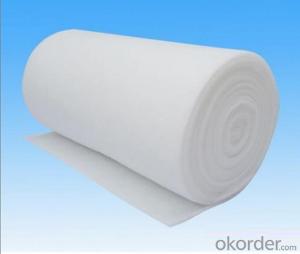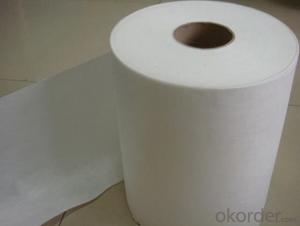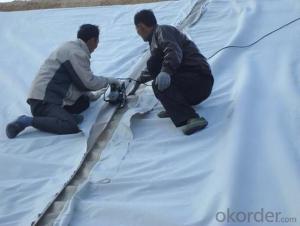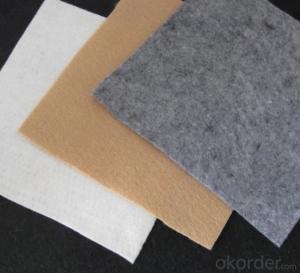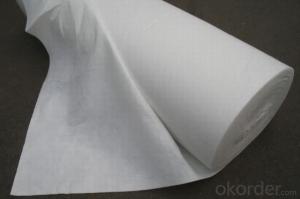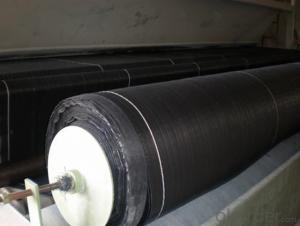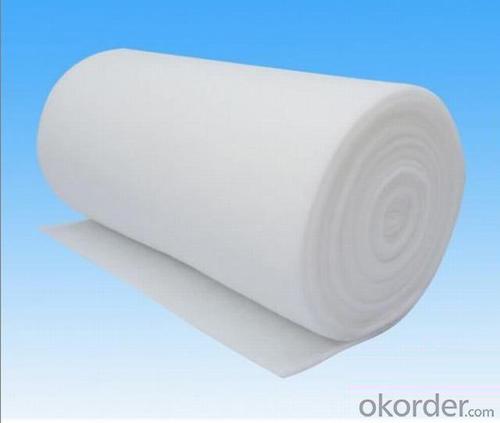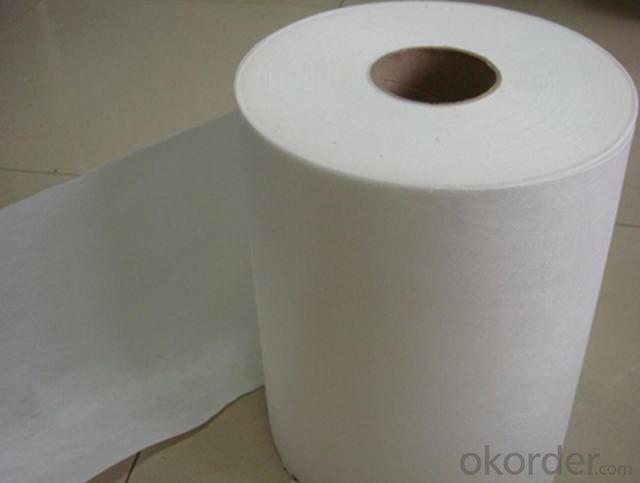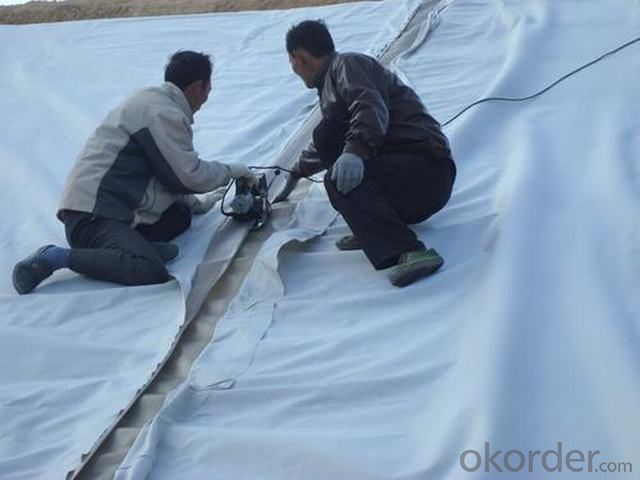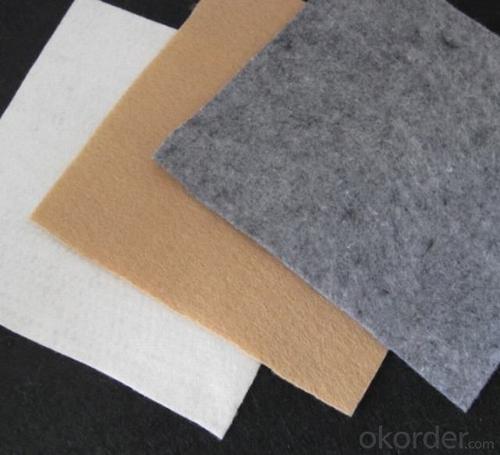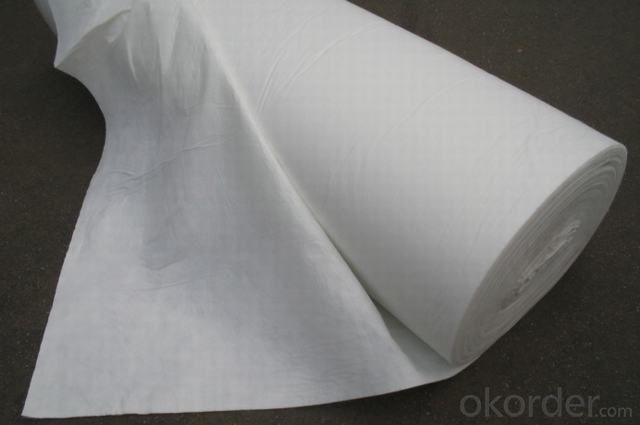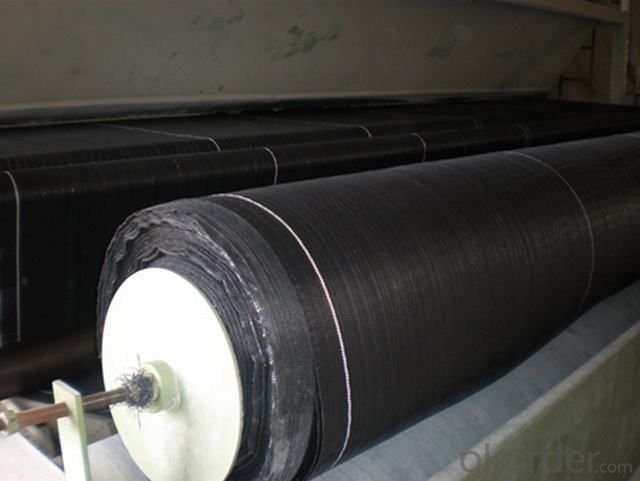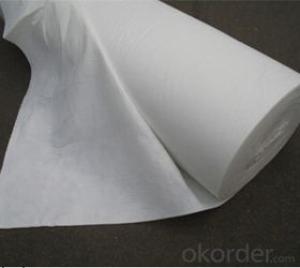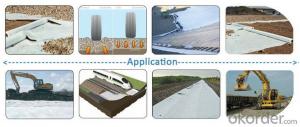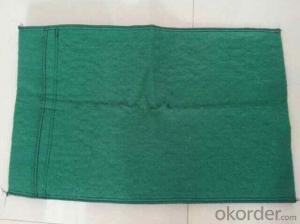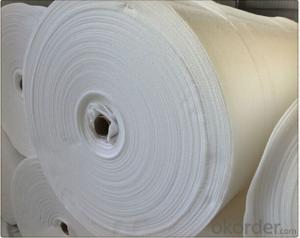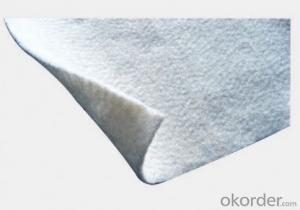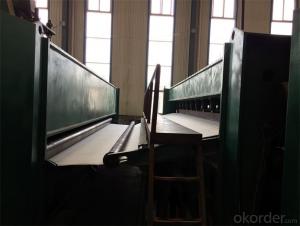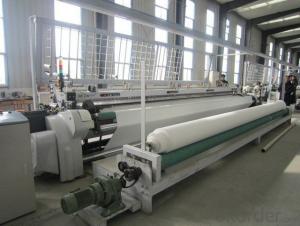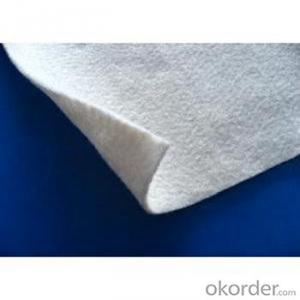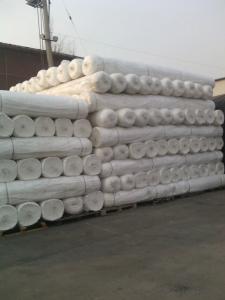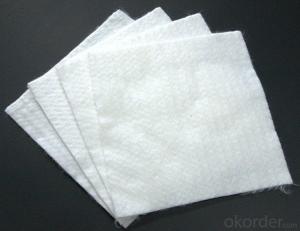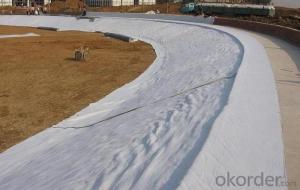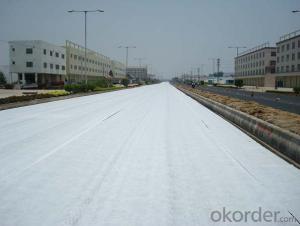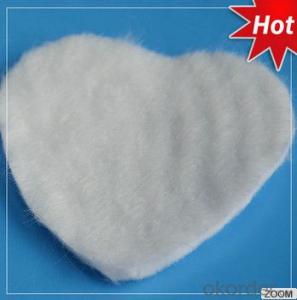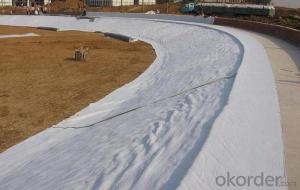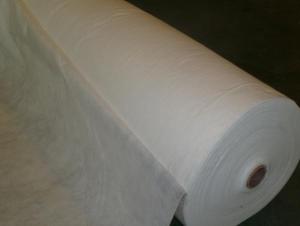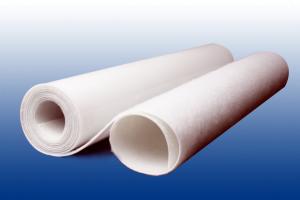Geogrid With Geotextile - Pet Continuous Filament Spunbond Needle Punched Nonwoven Geotextile for Drainage Function
- Loading Port:
- Qingdao
- Payment Terms:
- TT OR LC
- Min Order Qty:
- 20000 m²
- Supply Capability:
- 1500000 m²/month
OKorder Service Pledge
OKorder Financial Service
You Might Also Like
Specifications of PET Continuous Filament Spunbond Needle Punched Nonwoven Geotextile for Drainage Fuction:
1) Weight / Mass: 100g/m2-1500g/m2
2) Width: Within 8 m (1m-8m)
3) Length: 50m-100m/roll (as request)
4) Material: PP / PET
5) Color: Black , white , grey and other color
6) Certificate: CE/ISO9001 , ISO14001
7) Manufacturing method: nonwoven / woven
8) The Biggest geotextile manufacturer/factory in China for many years
Characteristic of PET Continuous Filament Spunbond Needle Punched Nonwoven Geotextile:
--It is produced by spinning, needle punching process with super-strength polyester chip, so that the total carrying capacity is further raised.
--It can keep primary characteristic for more long time, not liable to deform and break down.
--It shows great characteristics at cid and alkali resistance, insect resistance and anti-mycotic.
--Good water permeability.
--Withstand High temperature and freezing, and is able to adapt to the different outer environment.
--Light in weight, and can be packed as buyer require. So it is convenient to transport , storage and construct.
Technical Data Sheet of PET Continuous Filament Spunbond Needle Punched Nonwoven Geotextile for Drainage Fuction:
PET continuous filament spunbond needle punched nonwoven geotextile(representative average data.) | |||||||||
Test Item/Unit/No. | HY100 | HY150 | HY200 | HY250 | HY300 | Test Method | |||
Mechanical Properties | |||||||||
Tensile Strength | CD | kn/m | 4.8 | 8.3 | 10.9 | 14.5 | 18 | ASTM D 4595 | |
MD | 7 | 12 | 14 | 18 | 22 | ||||
Elongation at maximum load | CD | % | 65 | 64 | 63 | 62 | 61 | ||
MD | 64 | 63 | 62 | 61 | 60 | ||||
Grab Strength | CD | kn ≥ | 0.36 | 0.58 | 0.87 | 1.08 | 1.35 | ASTM D 4632 | |
MD | 0.42 | 0.78 | 1.07 | 1.33 | 1.6 | ||||
Grab Elongation | CD | % | 55 | 55 | 59 | 59 | 60 | ||
MD | 50 | 50 | 51 | 51 | 53 | ||||
Trapezoidal Tear | CD | kn ≥ | 0.16 | 0.23 | 0.31 | 0.39 | 0.46 | ASTM D 4533 | |
MD | 0.245 | 0.31 | 0.42 | 0.46 | 0.55 | ||||
Burst Strength-CBR plunger method | kn ≥ | 0.85 | 1.47 | 2.3 | 2.8 | 3.3 | ASTM D 6241 | ||
Puncture resistance | n ≥ | 220 | 320 | 430 | 540 | 650 | ASTM D 4833 | ||
Mullen Burst | Mpa | 1.2 | 1.8 | 2.3 | 2.8 | 3.3 | ASTM D 3786 | ||
Cone drop resistance(hole-Φ)Dynamic perforation diameter | mm | 34 | 30 | 26 | 22 | 19 | BS EN 918-1996 | ||
Hydraulic Properties | |||||||||
Flow Rate,Q100 | L/s/m² | 200 | 210 | 180 | 150 | 140 | ASTM D 4491 | ||
Permeability | cm/s | 0.48 | 0.43 | 0.39 | 0.36 | 0.34 | |||
Apparent Opening Size O95 | mm ≤ | 0.13 | 0.12 | 0.12 | 0.11 | 0.11 | ASTM D 4751 | ||
Apparent Opening Size O90 | mm ≤ | 0.12 | 0.11 | 0.11 | 0.1 | 0.1 | |||
Physical Identification Properties | |||||||||
Thickness 2KPa | mm | 1.1 | 1.3 | 1.8 | 2.5 | 2.9 | ASTM D 5199 | ||
Mass per unit area | g/m² | 100 | 150 | 200 | 250 | 300 | ASTM D 5261 | ||
Width | m | 2/3/6/ | 2/3/6/ | 2/3/6/ | 2/3/6/ | 2/3/6/ | |||
FAQ:
What is the main application of PET Continuous Filament Spunbond Needle Punched Nonwoven Geotextile?
The main application of our PET Continuous Filament Spunbond Needle Punched Nonwoven Geotextile is as follows: The highway, railway, soil-stone dam, breakwater, airport, backfill soil of retaining wall, slope protection, etc.
Where is your main market?
Our main market is in Middle East, South America and some African countries.
What is your advantages for PET Continuous Filament Spunbond Needle Punched Nonwoven Geotextile?
One of the largest manufacturer of PET Continuous Filament Spunbond Needle Punched Nonwoven Geotextile for Construction with advanced equipment, big production capacity and excellent quality.
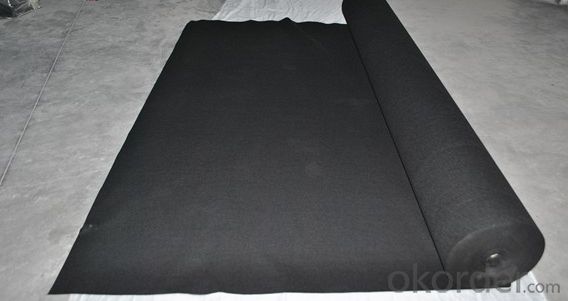
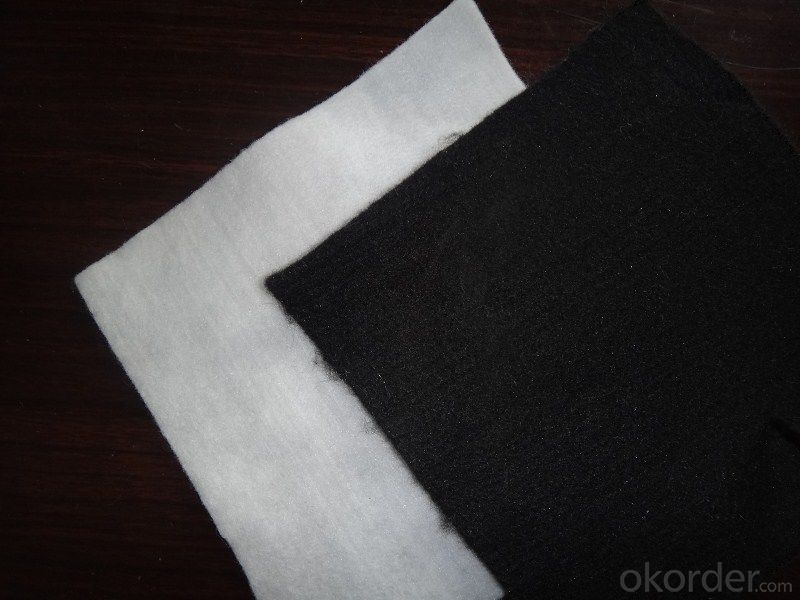
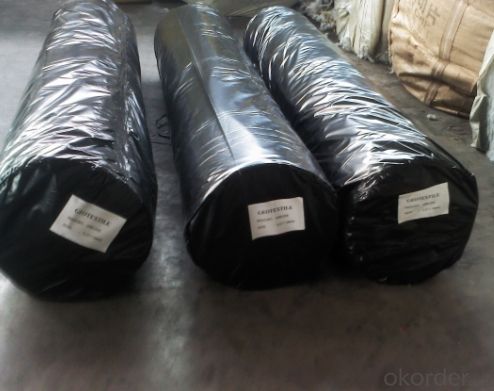
- Q: What are the different methods of geotextile installation?
- There are several different methods of geotextile installation, including trenching, direct placement, sewing, stapling, and adhesive bonding. Trenching involves excavating a trench and placing the geotextile fabric in it before backfilling. Direct placement involves simply unrolling and placing the geotextile on the desired surface. Sewing involves stitching the geotextile to another fabric or material, providing additional strength. Stapling involves using staples or nails to secure the geotextile to the ground or other surfaces. Adhesive bonding involves using specialized adhesives to attach the geotextile to the desired substrate. The choice of installation method depends on the specific project requirements and the type of geotextile being used.
- Q: Can geotextiles be used in railway projects?
- Yes, geotextiles can be used in railway projects. Geotextiles are commonly utilized in railway construction and maintenance for various applications such as separation, filtration, drainage, and reinforcement. They can help improve the stability, strength, and longevity of railway tracks, reduce maintenance costs, and enhance overall performance.
- Q: Can the tunnel longitudinal drains be wrapped with geotextiles and wrapped with a waterproof board?
- With geotextile wrapped drainage pipe is generally played the role of seepage drainage, do not need waterproof board (you said the waterproof board should be geomembrane it) Chong Hong geotextile material manufacturers
- Q: Can geotextiles be used for erosion control in golf courses?
- Yes, geotextiles can be used for erosion control in golf courses. Geotextiles are permeable fabrics that can be installed to stabilize soil and prevent erosion by providing a barrier against water flow. They are commonly used in various landscaping applications, including golf course construction and maintenance, to control erosion and improve soil stability.
- Q: Is the polypropylene composite geotextile and the polyethylene composite geomembrane the same?
- Geotextiles and geomembranes are not the same, but they complement each other to meet the engineering requirements. First introduced under the geotextile: geotextile is the state for civil engineering in the construction of a new type of construction materials, by filament or short fiber through different equipment and process shop into a mesh, and then after acupuncture and other processes to different Fibers are intertwined with each other, tangent to the fabric to make the fabric normal, so that the fabric is soft, plump, thick, stiff, to meet the different thickness to meet the requirements, according to the length of silk is divided into filament non-woven geotextile or short wire Non-woven geotextile, filament tensile strength higher than the short wire. Fibrous soft with a certain tear resistance. The main role is: filter, filter, reinforcement role. Specifications from 100 grams per square meter to 800 grams per square meter. The main material for the polyester fiber, with excellent permeability, filtration, durability deformation adaptability, and has a good flat drainage capacity (see below) Geomembrane to plastic film as anti-seepage substrate, and non-woven composite Made of geotextile impermeable material can be divided into two cloth a film, a cloth a film, its impermeability depends mainly on the plastic film impermeability. The geomembrane is a waterproof barrier material with the polymer of the polymer chemical material as the basic raw material. The proportion of small, strong extension, high adaptability to adapt to deformation, corrosion resistance, low temperature, good frost resistance. (See below)
- Q: What are the advantages of using geotextiles in agriculture?
- Geotextiles offer several advantages in agriculture, including erosion control, weed suppression, moisture conservation, and improved soil condition. They prevent soil erosion by stabilizing slopes and preventing sediment runoff, ensuring the longevity of cultivated areas. Geotextiles also act as a barrier to weed growth, reducing the need for herbicides and manual weeding. Additionally, they aid in conserving moisture by reducing evaporation and maintaining soil moisture levels. Furthermore, geotextiles promote better soil structure and fertility by preventing soil compaction, improving aeration, and facilitating nutrient absorption.
- Q: What are the advantages of using geotextiles in green space development?
- Geotextiles offer several advantages in green space development. Firstly, they help with soil stabilization by preventing erosion and promoting vegetation growth. This ensures the longevity of the green space by protecting the soil from being washed away during heavy rainfall or other environmental factors. Secondly, geotextiles can act as a barrier against weeds, reducing the need for herbicides and manual weed removal. This saves time and effort in maintaining the green space. Additionally, geotextiles improve water drainage and filtration, allowing for better moisture retention and preventing waterlogging. This leads to healthier plants and prevents water accumulation which can cause damage. Lastly, using geotextiles can enhance the aesthetics of the green space by providing a clean and uniform appearance. Overall, the use of geotextiles in green space development offers practical and aesthetic benefits, contributing to the successful and sustainable management of these areas.
- Q: GB / T geotextile sampling sampling frequency, 100 volumes equal to the number of square meters?
- Geotextile wide conventional is 6 meters, there are also more narrow and narrow, the length of conventional 50 meters or 100 meters, if the conventional calculation of a roll is 300 square meters or 600 square meters, 100 volumes will be multiplied by 100 on the line The
- Q: Are geotextiles effective in preventing soil erosion?
- Yes, geotextiles are effective in preventing soil erosion. They act as a barrier that reinforces the stability of soil, preventing it from eroding due to water or wind. Geotextiles also help in retaining moisture and promoting vegetation growth, further enhancing their effectiveness in preventing soil erosion.
- Q: Waterproof geotextile in which the location of the culvert, what use
- Used in the top and side, lining the inside, mainly the role of waterproof to prevent water seepage. Huazhi geotechnical materials manufacturers need to answer for your needs
Send your message to us
Geogrid With Geotextile - Pet Continuous Filament Spunbond Needle Punched Nonwoven Geotextile for Drainage Function
- Loading Port:
- Qingdao
- Payment Terms:
- TT OR LC
- Min Order Qty:
- 20000 m²
- Supply Capability:
- 1500000 m²/month
OKorder Service Pledge
OKorder Financial Service
Similar products
Hot products
Hot Searches
Related keywords
